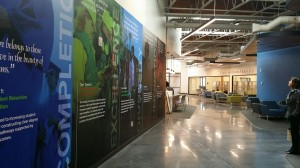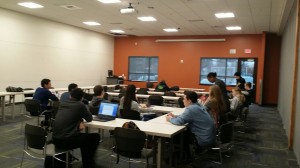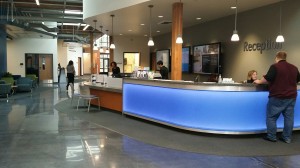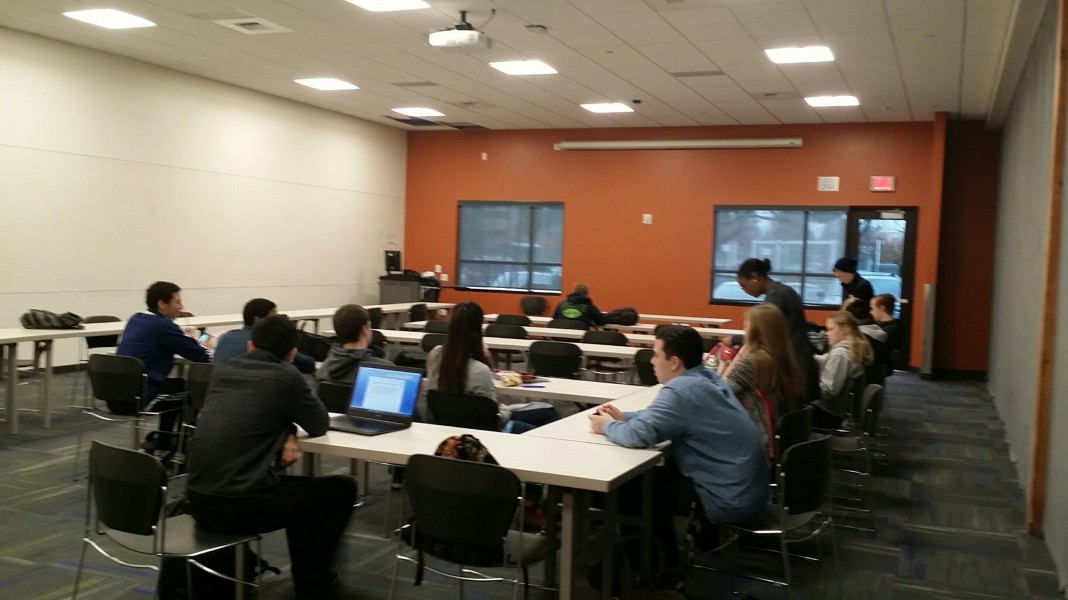When Madeline Christensen hears a bit of information in her English class, she’ll often remember having heard the same thing in Psychology. Equally, she says, “I’ll be in Psychology and think, ‘I can write about that with the things I learned in English.’ It’s really helpful and easier to realize connections when I hear similar things in two different classes.”
Christensen is in her first year at South Puget Sound Community College’s new Lacey campus and a participant in a pilot program that integrates content areas with classes like English. In the first quarter, students interested in particular subject areas have three options or ‘pathways’ including Individual and Society, (English and Psychology) The Natural World (English and Nutrition), and The Business World (English and Ethics). The classes offer both English 98 and English 101 depending on the level of the student. “Students take a subject area course so that the content [of their writing assignments] is contextualized,” says Erica Dixon, a psychology professor who developed the program in collaboration with colleagues James Schneider and Kathleen Byrd.

Every quarter offers a different menu of classes, but they’re strategically scheduled so that students who didn’t join in the fall can begin a pathway in winter quarter. It’s also possible to ‘jump’ pathways for those who discover their interests may lie elsewhere. “All those classes lead toward an associates degree,” says Dixon. “If a student started in the business pathway and realized they really want to do humanities, they can go over to the other pathway.”
Dixon’s interest in collaborative education is the result of 21 years of community college teaching. “A couple of years into my career I started team teaching and realized that it was not only the best learning environment for students, it was the best opportunity for professional development for faculty,” she says. “Working together, side by side, with somebody from a different discipline created an opportunity to learn from them. Then I saw students making these amazing connections between subject areas.”
Dixon joined forces with a group of faculty with similar backgrounds, and in 2010 they received a grant from the State Board of Community and Technical Colleges for developing faculty-learning communities. After researching best practices and conducting a review of the literature, they submitted a proposal to the deans at SPSCC in the fall of 2014. “We were subsequently asked to pilot the program on this campus because by the time it would be ready, this campus would be open,” she says. “It seemed like a good fit.”

The next step was finding teachers to implement the program. “We’ve really started with faculty we know have already done this in the past and are open to it,” says Dixon. Her team developed ten hours of workshops to train a cohort of six professors, three from the English department and three from specific subject areas. “We team teach the workshops, so we’re modeling what we’re teaching,” she says.
The cohort developed an overall theme for the quarter that encompasses all of their subject areas. For the fall quarter, the theme is Family and Society. Throughout the quarter, the Lacey Core professors attend three seminars – one in week two, one in week seven and one in week ten. “We’re trying to do this really intentionally,” says Dixon. “So far we’ve talked about rubrics and reflection. We asked the faculty to reflect on what it’s like to be a student in their classroom.”
For one student at least, the combined Psych/English class sparks critical thinking. “The pathway classes are strategically planned,” says Chandler Morgan. “They have specific assignments that correlate with each other. Initially, you have to really think about it to see the connections between them, but once you start making those connections and you discover them on your own, there’s a lot more cohesion with the learning than when everything is fed to us.”

Student Zak Cushon also appreciates the integrated nature of the program. “I like it because the assignments are linked together so the things I’m learning in one class are applicable to the other class.” An added benefit, he says, is the convenience factor. “It’s easier because I don’t have to drive to the main campus twice a week.”
That convenience was part of the equation when Dixon and her colleagues decided to integrate student services into the curriculum. Everything students need is available on the Lacey campus, and personnel from advising, counseling, library services, and the writing center are invited into pathway classes at critical junctures in the quarter.
“During week four we asked the faculty to give up twenty minutes of their time so the counselors can come in and share about the available counseling services,” says Dixon. “Advising comes in week six and seven right before students start registering for the next quarter. All the English faculty bring the writing center folks in to sit down with students and do workshops with them.”
That’s important because of the demographic make-up of the student body. “With community college, you can have first generation college students who don’t have the cultural capital that upper middle class students have from their families,” she says. “To navigate the bureaucracy can feel oppressive.”
According to Anne Molenda, Director of Student Services on the Lacey campus, the approach is working. “It was really nice because after we went in, we saw an uptick in students coming in to meet with us one on one. It’s great to be proactive and meet students, not just at that point of crisis when they missed everything.”
The first quarter will wrap up with a culminating forum. “They’ll bring all twelve classes together to present their work,” says Dixon. “It’s really about what the students can pull out of this.” The forum will be open to the public.
To register for classes or learn more about the pathways, visit the South Puget Sound Community College website.
Sponsored




















































